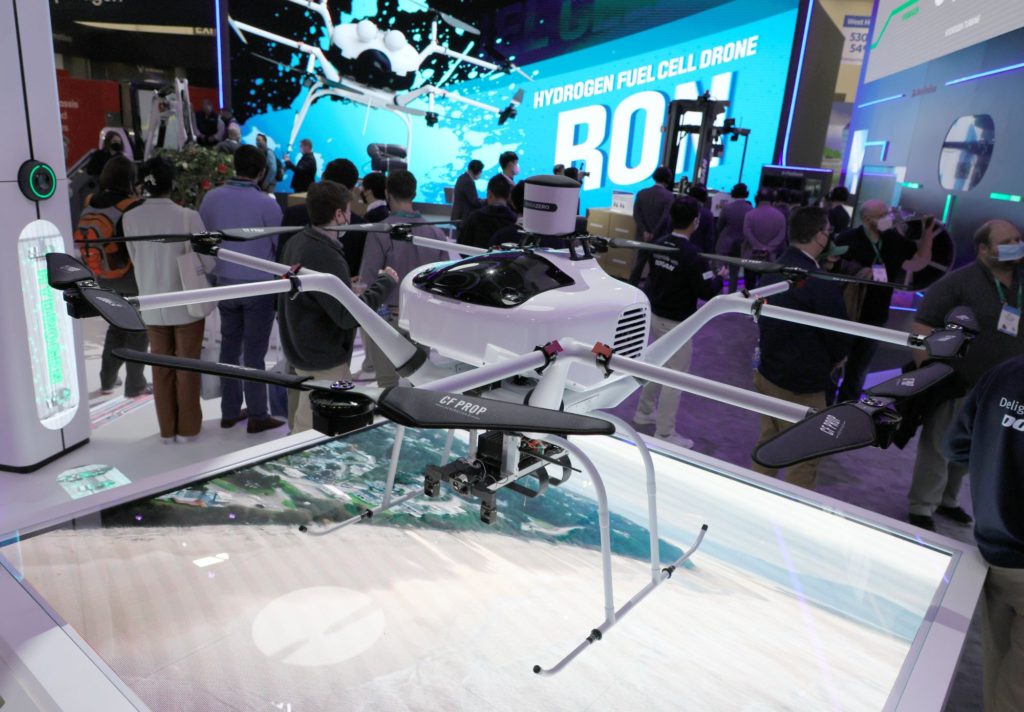(Bloomberg) — Doosan Group, a 126-year-old South Korean conglomerate emerging from restructuring, is looking to hydrogen-powered technology to help revive its fortunes and expand its presence in renewable energy.
“Our long-term vision is to provide fuel cells for various kinds of mobile applications, like robots, starting with hydrogen drones,” said Doosoon Lee, chief executive officer of unit Doosan Mobility Innovation. “We will also play a crucial role in the South Korean government’s goal to build a multiseat unmanned aerial vehicle.”
Doosan Mobility unveiled its first DS30 hydrogen drone in 2020 and launched an updated model – the DS30W – in Europe in November. The drones, which can fly for about two hours, are intended for industrial surveillance purposes, such as checking facilities around factories or at sea.
The company is targeting about $100 million in revenue from hydrogen fuel cells and drones within the next three or four years, according to Lee. The global market for drones used for industrial purposes could grow to 8.3 trillion won ($6.7 billion) by 2025 as companies use them more widely, he said.
Doosan Mobility said in March it received 27 billion won in investment from IDG Capital, Korea Investment Partners and DS Asset Management “in recognition of its growth potential in the hydrogen mobility business.” The funds will mostly be used to develop logistics cargo drones with hydrogen fuel cell technology, it said.
More: Drone Taxis and Bags of Rice Take Flight in Downtown Seoul
Hydrogen can overcome the power limits of standard lithium-ion batteries, enabling drones to fly higher and longer, Lee said. He expects growing demand for special-purpose hydrogen drones in areas such as surveillance and lifesaving, as well as the delivery industry.
Unlike battery-powered drones, Doosan Mobility’s hydrogen models show how much power is remaining through a remote-control system that can be installed on a personal computer or mobile phone app. The drones are waterproof, can travel 80 kilometers (50 miles) and endure strong winds, according to the company’s website.
“Doosan Mobility is a key future business for the group’s plan for seeking a new strategy after restructuring,” said Kim Dong-yang, an analyst at NH Investment & Securities Co. in Seoul. The Doosan group has the most advanced technology for hydrogen power generation in South Korea, he said.
As part of a restructuring from 2020 to this February, Doosan sold businesses including excavator-maker Doosan Infracore Co. and battery foil unit Doosan Solus, as well as its headquarters in Seoul. It still owns heavy industries and nuclear energy unit Doosan Enerbility Co. and construction-equipment maker Doosan Bobcat Inc.
“Doosan still has cash to invest in other new businesses,” said Kim Jang-Won, an analyst at IBK Securities in Seoul.
Doosan Mobility, which says it has capacity to produce 2,000 hydrogen-powered drones a year, opened a branch in the southern Chinese city of Shenzhen in 2019 to boost sales and build local partnerships. Its total sales in the fourth quarter of 2021 jumped 108% from a year earlier, according to holding company Doosan Co. Revenue is projected to rise 93% to about 12 billion won this year.
More stories like this are available on bloomberg.com
©2022 Bloomberg L.P.











